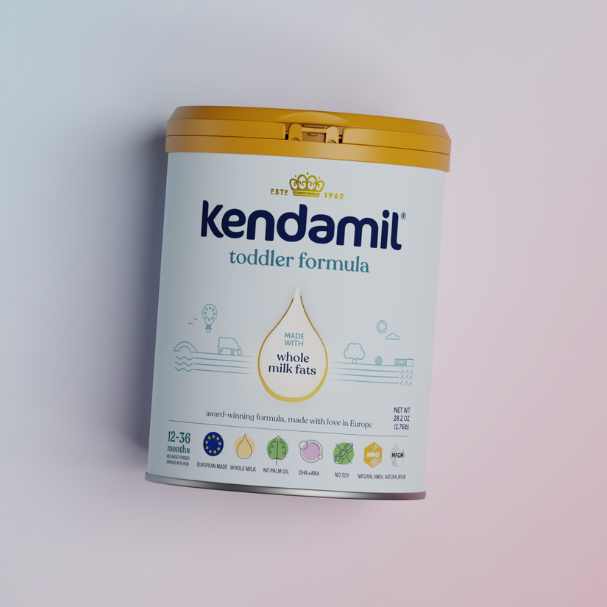With the increase in demand for gentler infant formulas, many parents are turning to goat milk formula as a natural alternative to cow milk formula. Luckily for those in the USA who are considering switching to goat milk formula, Kendamil Goat will soon be available in Target stores nationwide. Kendamil Goat is the only European-made, whole goat milk infant formula available in the US and is a naturally gentle alternative for sensitive tummies. So you might be wondering what is goat milk formula and what are the benefits? Let’s get into it…
What is goat milk formula?
Goat milk formula is made with goat milk instead of cow’s milk, with some formulas (including Kendamil) also using gentle goat whey to match the protein ratio found in breast milk. The big difference between cow and goat milk lies in their protein composition. We’ll dive into the details on this shortly, but for now, the naturally smaller and softer curds formed by goat milk is what makes goat milk easier for babies to digest. For babies suffering with digestive issues such as colic, diarrhea, constipation, reflux or spit-up, goat milk may offer a gentler, natural alternative. There are several additional features of goat milk that make it a closer match to breast milk. It has high levels of selenium, an essential mineral that helps support baby’s immunity. It also contains naturally higher levels of oligosaccharides (up to 10x more than cow’s milk!), which supports baby’s gut health. Sounds magical, right? So let’s discover more about the benefits of goat milk.
What are the benefits of goat milk for baby?
Gentle on digestion
Goat milk predominantly contains A2 beta-casein proteins, which match the proteins found in breast milk and may be easier to digest for sensitive babies. For infants experiencing digestive discomfort such as constipation, gassiness and reflux, using goat milk formula, which mostly contains the gentler A2 beta-casein protein, may reduce the likelihood of these symptoms occurring, making it a natural alternative for infants with sensitive tummies.
Goat is a naturally casein protein-dominant milk, so Kendamil intentionally adds goat whey to rebalance the protein ratio to be whey dominant, matching the ratio of breastmilk and helping baby digest faster. A recent study showed that the timing of protein digestion and protein absorption of goat milk infant formula was much closer to breast milk than how cow’s milk infant formula was digested (1).
Softer curds, closer to breast milk
When baby digests their milk it reacts with their stomach acid, creating curds. Cow’s milk naturally forms slightly larger, firmer curds, whereas goat milk creates softer, smaller and looser curds. While cow’s milk is perfectly suited for the vast majority of babies, the softer curds formed by goat’s milk may help certain sensitive babies to digest quicker and absorb their nutrients more efficiently.
‘Good fats’
Natural goat milk fats (sourced from whole goat milk) are naturally easier for your baby to digest. This is due to goat milk’s unique fatty acid composition, versus cow’s milk. It turns out the fatty acid composition of goat milk is quite different to cow milk fats; for example short/medium fatty acids make up 15% of goat milk’s fatty acid content, compared to just 5% in cow’s milk (which relies more on longer fatty acid chains). These short/medium fatty acid chains, more present in goat milk, are easier for your baby’s tummy to break down, which may support easier and gentler digestion (2).
Naturally supports gut health and is anti-inflammatory
Goat milk contains naturally high levels of oligosaccharides (in other words, natural prebiotics, similar to those found in breast milk). So why are we buzzing about oligosaccharides? Oligosaccharides have prebiotic and anti-inflammatory properties. The oligosaccharides in goat milk help promote the growth of beneficial, healthy bacteria and in limiting the ability of harmful bacteria to attach to intestinal cells. Pretty amazing! In fact, goat milk has 10 times more oligosaccharides than cow’s milk (3). And to top it off goat milk has both acidic and neutral oligosaccharides, many of which are structurally comparable to human milk oligosaccharides (HMOs) as found in breast milk (4).
Supports the immune system
Goat’s milk contains naturally high levels of selenium, an essential mineral found in breast milk. In fact, goat milk contains 27% more selenium than cow’s milk. So what’s the deal with selenium? It’s a rare mineral that is a crucial component of various enzymes, known as selenoproteins, which play essential roles in antioxidant defense. In other words it can support the immune system and may help fight off disease.
Softer, Consistent Poop
Nothing breaks a parent’s heart more than a constipated baby. But did you know studies show that the frequency and consistency of stools of infants fed goat infant formula were more similar to those who were breastfed versus cow infant formula (2)? Formula-fed babies can often have harder stools than those who are breastfed, which can be due to the malabsorption of fat and the formation of insoluble calcium fatty acid soaps in their stools (especially common in formulations containing palm oil). Thankfully, the fat present in goat milk is more easily absorbed than other milks. For babies struggling with constipation or dry, hard poop that is difficult to pass, goat milk may help support their digestive issues. Symptoms of constipation to look out for are: lacking energy, irritability, eating less, firm tummy, passing dry, hard poop, pooping less than 3 times a week and smelly poops.
What is the difference between cow and goat milk?
Kendamil cow milk and Kendamil goat milk formulas are both lactose-based and crafted with whole milk, which naturally includes MFGM, an ingredient that has been shown to support cognitive development.The main difference lies in the protein composition, with goat milk predominantly containing A2 beta-casein proteins. Proteins naturally form curds in the digestive tract during infant milk digestion. Goat milk curds are naturally softer and smaller than those formed by cow’s milk, which some studies suggest may be easier to digest for sensitive babies.
One of the most important considerations when choosing a baby formula is whether your baby has any allergies or sensitivities. Cow's milk protein allergy (CMPA) affects between 2-6% of children in the US, mainly affecting children in their first year. About 50% of children have been shown to resolve CMPA by the time they turn 1 year (5). Symptoms of CMPA can include digestive issues, such as fussiness, vomiting and diarrhea. If your baby is diagnosed by your pediatrician to have a cow's milk protein allergy (CMPA) or is otherwise sensitive to cow's milk, we recommend discussing with your pediatrician the infant formula most suited to your baby’s needs. Goat milk formulas are not recommended for children with a confirmed diagnosis of cow milk protein allergy (CMPA).
Choosing the best baby formula for your little one can be a daunting task, but with the right information and guidance, you can make an informed decision that meets your baby's needs. Every baby is different and what works for one may not work for another. If your baby is suffering with digestive issues we would always recommend speaking to your pediatrician to first rule out a cow’s milk protein allergy. For those babies with sensitive tummies, Kendamil Goat milk formula could provide a natural, gentler alternative for your family.
Resources
(2) Association of infant feeding practices in the general population with infant growth and stool characteristics. 2011 Aug 31. National Library of Medicine. doi: 10.4162/nrp.2011.5.4.308
(3) van Leeuwen SS, Te Poele EM, Chatziioannou AC, Benjamins E, Haandrikman A, Dijkhuizen L. Goat Milk Oligosaccharides: Their Diversity, Quantity, and Functional Properties in Comparison to Human Milk Oligosaccharides. J Agric Food Chem. 2020 Nov 25;68(47):13469-13485. doi: 10.1021/acs.jafc.0c03766. Epub 2020 Nov 3.
(4) Comparison of the Bifidogenic Effects of Goat and Cow Milk-Based Infant Formulas to Human Breast Milk in an in vitro Gut Model for 3-Month-Old Infants. National Library of Medicine. 2020 Dec 11. doi: 10.3389/fnut.2020.608495
(5) Cow's milk protein allergy in children: a practical guide. National Library of Medicine. 2010 Jan 15. doi: 10.1186/1824-7288-36-5














